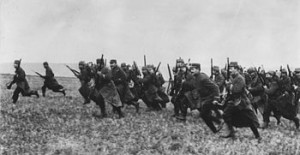
It cannot be overstated that World War I shaped the course of Twentieth Century history. This epic conflict that spun the world into chaos and conflagration from 1914 to 1918 set the tone for the rest of human history since then. One hundreds after the opening phases of the Great War, we are still feeling the effects of the war, many times, in more ways that we consciously notice.
When one examines the history of the First World War, there are many instances in the military course of the war which lend themselves as perfect examples of the providence of God. The First Battle of the Marne was one such instance. The German armies had embarked on a grand odyssey of conquest in the spirit of nationalist pride, laid in the principles of Social Darwinism, survival of the fittest and national superiority. They had raided Belgium and moved into France, overcoming limited but noteworthy resistance from the Belgian army. The courageous Belgians made stands at Liege and Antwerp, thereby delaying what the German High Command expected to be a quick and complete conquest of the tiny nation. This in turn had enabled the British and French armies to assemble and prepare for war in northeastern France and Belgium. The quietest corner of western Europe was now engulfed in a fiery inferno, caught in the throes of timeless destiny.
The French, acting in the intense spirit of Napoleon, invaded enemy ground to regain the “Lost Provinces” of Alsace and Lorraine and to avenge the humiliation of past generations in 1871. This proved to be an action most ill-advised. The French incursion into Alsace-Lorraine was disadvantageous to the French war cause and it was a strategic failure. Within a few weeks’ time the Germans were within sight of the Eiffel Tower, knocking at the door to the very heart of the French nation. The British and French were scrambling desperately to save Paris and thus the war effort. The prevention of a German victory seemed less likely than a German victory itself.
Then the world watched the “Miracle of the Marne” unfold. The fortitude and courage of the Anglo-French forces on the banks of the Marne River halted the German advance and drove them back. The two sides commenced a dangerous game of tactical movements in an attempt to outflank each other. This was dubbed, the “Race to the Sea”. It ended in no tactical advantage but rather a series of trenches scarring the countryside of France and Belgium. Years of lethal struggle would be born from the “miracle” of the Marne. These years would see the introductions of weapons like poison gas and tanks.
Let us imagine the alternative to a miracle at the Marne: a rout of the Anglo-French forces and the fall of Paris. A case could be made that this would still not have ended the war but let us assume for a moment that the fall of Paris does indeed lead to a German victory. We may suppose that territory and finances would be transferred from France to Germany. The British navy may have suffered consequences of a German victory. Germany would no doubt be the greatest empire in Europe. France would wallow in further bitterness and humiliation. Britain would be crippled. In the end, however, we must determine whether the situation described above would be more in the interest of humanity than the reality of a worldwide war and millions of deaths, not to mention a terrible legacy left to hinder the progress of humanity for another century. The Marne may have been a miraculous but it was also tragic in its consequences and devastating in its legacy.
Note: This post is part of a series of blogpost on the First World War, leading up to the release of “World War I: The Unraveling of the World” by Jace Bower in the Fall of 2014. To see other posts in this series, type “Unraveling” in the search bar located in the top right corner of this page.
